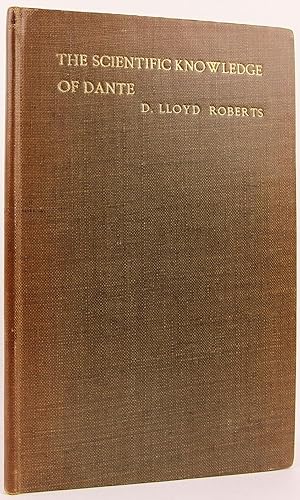About this Item
1914 presentation copy, first edition Manchester University Press (Manchester, England), 6 x 9 1/4 inches tall brown buckram cloth hardbound, no dust jacket, gilt lettering to front cover, finely printed on laid paper, title page in red and black ink, 28 pp. Very slight rubbing and edgewear to covers, with slight bumping to tips. On the blank front free-endpaper, the author's presentation inscription, written in the year of issue, to prior owner 'John Ballinger Esq.' This would appear to be Sir John Ballinger CBE (1860 - 1933), the first librarian at the National Library of Wales, described by its current librarian, Andrew Green, as 'one of the most distinguished professional librarians of his time.' On the presentation inscription, Roberts adds in after Esq. the initials MA, and indeed Sir Ballinger received an honorary MA from the University of Wales in 1904. ~DDD~ The author's review of the scientific attainments of late medieval poet Dante Alighieri (circa 1265 - 1321), whose Divine Comedy, originally called Comedia and later christened Divina by Boccaccio, is widely considered the greatest literary work composed in the Italian language and a masterpiece of world literature. Dante, concludes D. Llyod Roberts, 'was a many-sided and learned man' who 'could temper the abstruse deductions of science to his own use, clothing in poetic imagery the results of crude observations, transforming them into beauteous similes.' David Lloyd Roberts (1835 - 1920) was born at Stockport, England, the son of a cotton spinner. He studied at the Manchester School of Medicine and the Royal Infirmary, and obtained the post of regular surgeon-in-ordinary at St. Mary's Hospital for Women and Children in 1858. Lloyd Roberts wrote a popular Student's Guide to Practical Midwifery (1876) and achieved some distinction with his edition of Sir Thomas Browne's Religio Medici (1898) and this, his paper on The Scientific Knowledge of Dante (1914). He was a man of wide culture and a famous collector of mezzotints, water colours, glass, porcelain, silver, furniture and books. He left the Royal College of Physicians his valuable library of 3,000 books, including 53 incunabula, and he endowed the Lloyd-Roberts Lectures, given annually on a subject of medical or scientific interest. In Manchester he was a well-known and loved character who is said to have defined gynaecology as 'anything either curable or lucrative' and who drove daily through the busy streets in an old-fashioned brougham.
Seller Inventory # DDD-0161-5116
Contact seller
Report this item




